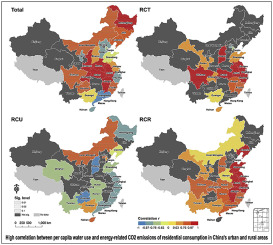Journal of Cleaner Production ( IF 9.7 ) Pub Date : 2018-05-16 , DOI: 10.1016/j.jclepro.2018.05.117 Jialiang Cai , He Yin , Olli Varis

|
China has been undergoing unprecedented urbanization since the 1978 economic reform, with the present growth rate of 20 million people per year. This rapid and perennial progress has been raising concerns about environmental sustainability, due to a severe nationwide deterioration of China's environment and ecosystems in the context of ceaselessly increasing demand for water and energy. It is therefore of prime necessity and importance to comprehend China's water and energy security under the effect of dramatic demographic changes. Analyses of this issue still remain few and far between, and a comprehensive picture is not available that would help understand China's recent development in urbanization, its spatial features and links to water and energy security, particularly regarding residential consumption, and related national policy-making. Consequently, we address these knowledge gaps by performing an integrated and quantitative spatio-temporal analysis of the impacts of China's urbanization on water use and energy-related CO2 emissions of residential consumption. We propose adding residential per capita water use and per capita energy-related CO2 emissions as national indicators for policy-making targets of China's water and energy security. Over the study period of 2003–2012, per capita rural residential water use was on the increase, while urban use showed the opposite trend. Rural consumption has been remarkably higher than the urban, and this gap appears to be growing. In contrast, the per capita energy-related CO2 emissions of residential consumption augmented significantly in both urban and rural areas nationwide. Besides, both the total and rural per capita residential water use and energy-related CO2 emissions showed a significant positive correlation. However, in urban areas this correlation was negative.











































 京公网安备 11010802027423号
京公网安备 11010802027423号